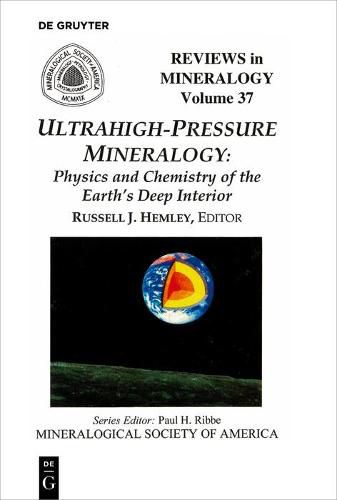Readings Newsletter
Become a Readings Member to make your shopping experience even easier.
Sign in or sign up for free!
You’re not far away from qualifying for FREE standard shipping within Australia
You’ve qualified for FREE standard shipping within Australia
The cart is loading…






This title is printed to order. This book may have been self-published. If so, we cannot guarantee the quality of the content. In the main most books will have gone through the editing process however some may not. We therefore suggest that you be aware of this before ordering this book. If in doubt check either the author or publisher’s details as we are unable to accept any returns unless they are faulty. Please contact us if you have any questions.
Volume 37 of Reviews in Mineralogy, divided into three sections, begins with an overview (Chapter 1) of the remarkable advances in the ability to subject minerals-not only as pristine single-crystal samples but also complex, natural mineral assemblages-to extreme pressure-temperature conditions in the laboratory. These advances parallel the development of an arsenal of analytical methods for measuring mineral behavior under those conditions. This sets the stage for section two (Chapters 2-8) which focuses on high-pressure minerals in their geological setting as a function of depth. This top-down approach begins with what we know from direct sampling of high-pressure minerals and rocks brought to the surface to detailed geophysical observations of the vast interior. The third section (Chapters 9-19) presents the material fundamentals, starting from properties of a chemical nature, such as crystal chemistry, thermochemistry, element partitioning, and melting, and moving toward the domain of mineral physics such as melt properties, equations of state, elasticity, rheology, vibrational dynamics, bonding, electronic structure, and magnetism. The Review thus moves from the complexity of rocks to their mineral components and finally to fundamental properties arising directly from the play of electrons and nuclei. This volume was prepared for a short course by the same title, organized by Russell J. Hemley and Ho-kwang Mao and sponsored by the Mineralogical Society of America, December 4-6, 1998 on the campus of the University of California at Davis.
$9.00 standard shipping within Australia
FREE standard shipping within Australia for orders over $100.00
Express & International shipping calculated at checkout
This title is printed to order. This book may have been self-published. If so, we cannot guarantee the quality of the content. In the main most books will have gone through the editing process however some may not. We therefore suggest that you be aware of this before ordering this book. If in doubt check either the author or publisher’s details as we are unable to accept any returns unless they are faulty. Please contact us if you have any questions.
Volume 37 of Reviews in Mineralogy, divided into three sections, begins with an overview (Chapter 1) of the remarkable advances in the ability to subject minerals-not only as pristine single-crystal samples but also complex, natural mineral assemblages-to extreme pressure-temperature conditions in the laboratory. These advances parallel the development of an arsenal of analytical methods for measuring mineral behavior under those conditions. This sets the stage for section two (Chapters 2-8) which focuses on high-pressure minerals in their geological setting as a function of depth. This top-down approach begins with what we know from direct sampling of high-pressure minerals and rocks brought to the surface to detailed geophysical observations of the vast interior. The third section (Chapters 9-19) presents the material fundamentals, starting from properties of a chemical nature, such as crystal chemistry, thermochemistry, element partitioning, and melting, and moving toward the domain of mineral physics such as melt properties, equations of state, elasticity, rheology, vibrational dynamics, bonding, electronic structure, and magnetism. The Review thus moves from the complexity of rocks to their mineral components and finally to fundamental properties arising directly from the play of electrons and nuclei. This volume was prepared for a short course by the same title, organized by Russell J. Hemley and Ho-kwang Mao and sponsored by the Mineralogical Society of America, December 4-6, 1998 on the campus of the University of California at Davis.